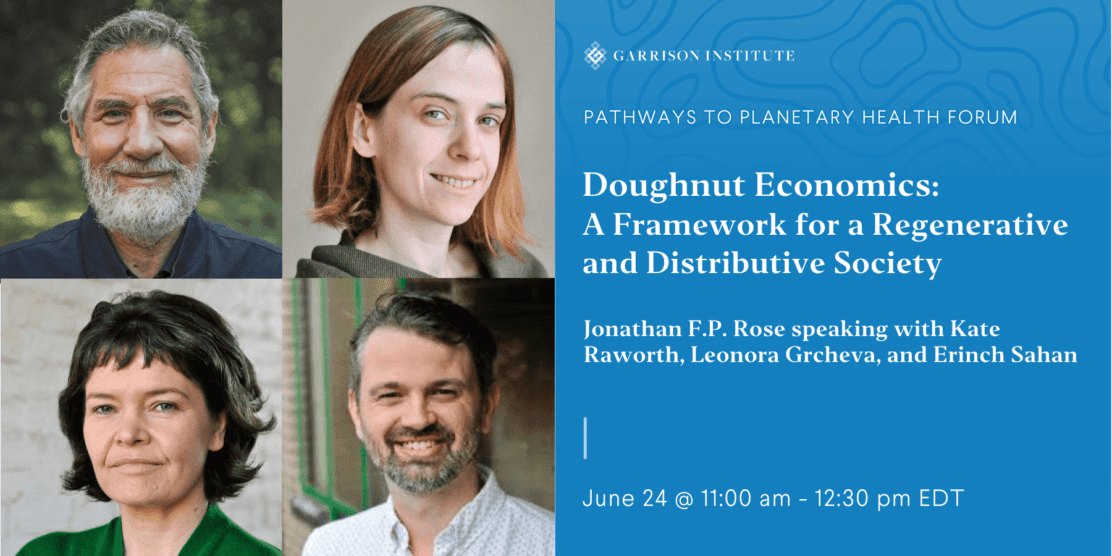Doughnut Economics Action Lab
Doughnut Economics: A Framework for a Regenerative and Distributive Society
Kate Raworth, Leonora Grcheva, and Erinch Sahan in conversation with Jonathan F.P. Rose
On Monday, June 24th, 2024, Kate Raworth, Leonora Grcheva, and Erinch Sahan of the Doughnut Economics Action Lab joined Garrison Institute co-founder Jonathan F.P. Rose for a conversation hosted by Pathways to Planetary Health on an economic framework for a regenerative and distributive society.
The Doughnut Economics Action Lab (DEAL) is motivated by a world in which the economy operates within planetary boundaries while also providing all people with the means to live a good life. The DEAL team uses their diverse backgrounds to promote these issues at all levels of government, in communities, with businesses, and through educational materials.
The conversation began with Kate Raworth – a renegade economist focused on making economics fit for 21st century realities – describing Doughnut Economics by asking the question “What is the goal of economics?” and answering it with a clear purpose: “Social and ecological wellbeing, rather than growth or many other economic indicators that we pay too much attention to.“
The group acknowledged that economics has become like the mother tongue of modern public policy, and that the predominance of economic thinking has crowded out other important views. It’s often forgotten that economic thinking is part of much broader whole systems thinking, including more relational and ecological views that focus less on transactions conducted through price- and market-based exchange.
Whole systems thinking can extend to the land. In modern economic thinking, land is often considered an asset, capital, commodity, or property. Land is described as an object. In native Hawaiian language, land is “that which feeds.” * This language and the underlying mental models are more about relationships among living Earth and how we are part of cycles of life.
Kate described work with Kamana Beamer on re-creating a circular economy in Hawaii. In their discussions, they decided that the word “own” doesn’t reflect collective responsibility for – and responsibility to – nature.
They centered principles of responsibility, relations, agreements, and flow, and came up with the term “knownership” – an invitation to reflect on how you are known to the land and how you know the land. At the heart of “knownership” is a deep, long-term, woven relationship with the land.
The conversation further explored these rich ideas and provided examples of how they can be applied to transform reality on the ground.
The participants discussed examples of cities applying doughnut economics thinking, civil society designing distributive sources of wealth creation, and businesses recognizing the value of nature. For example, Faith in Nature is a business that has made Nature a director on their board. In partnership with Lawyers for Nature and Earth Law Center, they are changing the way they think about Nature as central to their decision-making process.
This online event was part of a continuing series, the Garrison Institute’s Pathways to Planetary Health Forum.
Additional resources:
* Puna Dawson, an internationally honored Elder of the Hawaiian Islands and record keeper of Hawaiian culture and history, shared similar stories with language and song about the land at The Garrison Institute for a Planetary Health Symposium in 2023.
To learn more about the work of the Doughnut Economics Action Lab, please visit:
📢 Workshop guide for businesses (2hr version here, 5hr version here)
🏢 Policy-makers guide here
📝 Register to facilitate Doughnut business workshops here
🌎 Find registered workshop facilitators here
📚Let’s get it started guide here
A book authored by Kate Raworth, titled ‘Doughnut Economics: Seven Ways to Think Like a 21st-Century Economist.’
